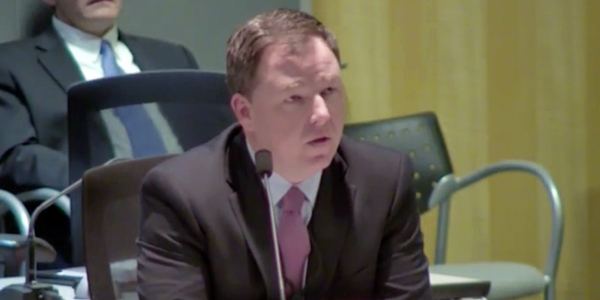ERCOT plans to revise its bylaws after discovering that dozens of members could be construed as affiliates under current rules because of stakes owned by investment funds such as Vanguard Group and Fidelity Management and Research.
The ISO learned of the issue from Vistra Energy, which informed ERCOT in September that Vanguard owns more than 5% of its voting securities — the current threshold for presuming that a shareholder exercises “substantial influence or control.”

Seely | ERCOT
ERCOT General Counsel Chad V. Seely told the board Tuesday that further investigation into Vistra’s letter identified 30 members who could be considered affiliates of each other based on common equity investors and that the number could go as high as one-third of the ISO’s 309 members.
Already, more than a dozen companies, including Calpine, Dynegy, Exelon and NRG Energy, have informed ERCOT they are in a situation like Vistra.
In addition to Vanguard and Fidelity, ERCOT said it has determined that at least five other investment firms may own more than 5% of two or more members: BlackRock, Capital Research Global Investors, Hotchkis & Wiley Capital Management, Oaktree Capital Management and State Street Global Advisors.
“In brief, ERCOT legal believes that this is just the beginning of identifying a longer list of potential members who may be affiliates through common equity ownership by a broader list of institutional investors,” Seely wrote board members in a memo.
Seely said companies deemed to be affiliates could be forced to change their industry segment or lose their voting rights.
His office issued membership applications on Oct. 2 for the year 2018. Corporate members must be registered by Nov. 10 to vote on board members at ERCOT’s Dec. 12 elections.
To address the issue, Seely recommended that the ISO revise the affiliate definition in the bylaws. In the interim, he said ERCOT should issue a “blanket” resolution saying that investment companies that own less than 20% of a member are assumed not to have control of the member.
The higher threshold would apply only to shareholders meeting one of the exclusions from the definition of “affiliate” under Texas’ Public Utility Regulatory Act (PURA) or has been determined to hold ownership interests in the member for investment purposes only. Not eligible for the 20% trigger would be members sharing a common parent or board member or under common influence or control of another entity.
Board Nominees

Corporate members will vote during the annual meeting Dec. 12 on a second term for unaffiliated board member Peter Cramton, a University of Maryland economics professor. They also will consider a newcomer, Terry J. Bulger, a banking executive specializing in risk management.
Unaffiliated directors, who serve staggered three-year terms, are also subject to approval by the Public Utility Commission of Texas. (Tuesday was the first ERCOT board meeting attended by new PUCT Chair DeAnn Walker.)
Consent Items
The board approved three nodal protocol revision requests (NPRRs) and one system change request (SCR) on the Technical Advisory Committee consent list.
- NPRR768 — Revises the categories of ERCOT-initiated actions that trigger the real-time online reliability deployment price adder pricing run to ensure prices reflect current system conditions.
- NPRR821 — Eliminates the congestion revenue right (CRR) deration process for resource node to hub or load zone CRRs, an effort to improve CRR funding.
- NPRR840 — Synchronizes the implementation of NPRR782 (settlement of infeasible ancillary services due to transmission constraints) by removing the two-hour advance notice period inadvertently left in protocol language when NPRR782 was approved.
- SCR791 — Populates unused megawatt and price values in security-constrained economic dispatch (SCED) generation resource data (GRD) energy offer curves with null values rather than zeroes, to improve the usability of the 60-day SCED GRD disclosure report.
Consent, Non-Consent Items OK’d

The board also approved three additional NPRRs on individual voice votes:
- Director Carolyn Shellman, of the Municipal Market segment, voted against two NPRRs, citing budgetary concerns. NPRR817 created the Panhandle 345-kV trading hub that would be excluded from the ERCOT-wide hub average and bus average calculations at an estimated cost of $150,000 to $200,000. “This would reduce the cost of future hubs,” TAC Vice Chair Bob Helton said.
- Shellman also opposed NPRR829, which will allow a qualified scheduling entity to provide data on its net generation to the ERCOT transmission grid from their non-modeled generators so that the output can be considered in the estimate of real-time liability (RTL). The change is expected to cost between $200,000 and $300,000. The members of the Municipal segment opposed the proposal, but ERCOT supported it, saying it will improve the calculation of collateral requirements and transparency into non-modeled generation.
- The board unanimously approved NPRR836, which incorporates 11 binding document forms into the protocols as a new Section 23, and allows changes to the forms to be made using the administrative NPRR process. Morgan Stanley, a member of the Independent Power Marketer segment, opposed the proposal at the Protocol Revisions Subcommittee.
Line of Credit
After an executive session, the board briefly reopened the meeting to renew its revolving line of credit with JPMorgan Chase.
— Rich Heidorn Jr.




